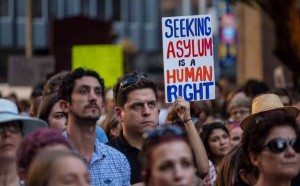Misconceptions about asylum seekers
Australia is in the grip of ‘Islamisation’ that is threatening Christian values, asylum seekers are given better treatment than Australians on welfare and they are queue jumpers.
These are just some of the misconceptions held by many Australians, according to a new study conducted by The University of Melbourne.

New research highlights the misconceptions many Australians hold about asylum seekers
The research found there were many misconceptions and knowledge gaps about asylum seekers – with the least informed people relying on commercial TV and tabloid newspapers for information.
The biggest source of negative attitudes towards asylum seekers was prejudiced against Muslims with lots of respondents linking the two.
Welfare recipients who were struggling financially – especially those in western Sydney and rural areas – were more likely to have negative attitudes to people seeking asylum.
They also wrongly thought they were given preferential treatment for welfare and housing.
But interestingly, many respondents also said they would pay a people smuggler to get on a boat if it meant giving their own children a chance at a better life.
These dual attitudes were seen in many of the ten research focus groups, which consisted of around 100 both white and blue collar workers, from city and country areas in NSW, Victoria and Queensland.
Common attitudes to asylum seekers included: a belief asylum seekers were a drain on health services, welfare and jobs; asylum seekers live in ghettos; Islam is an intolerant religion; Muslims planned to introduce Sharia law into Australia and subject everyone to it; and, Australia is not screening asylum seekers well enough
According to researcher Dr Denis Muller, the single most important driver of negative attitudes towards asylum-seekers is religious prejudice, sometimes expressed as concern about the “Islamisation” of Australia.
“There are two aspects to this phenomenon, and they feed into each other,” he said.
“The first is a view that Islam is an intolerant religion. In this view, Muslims demand that the rest of society tolerates Islam, but are not willing in return to show equal tolerance to non-Muslims. The second aspect is that Islam is seen as inseparable from the threat of terrorism,” Dr Muller said.
“The combination of these two aspects produces a potent fear about what Australia might be opening itself up to if it did not take stringent measures to screen asylum-seekers.
“Implicit in this is the assumption that asylum-seekers are all or mainly Muslims. This leads to a syllogistic association in which asylum-seekers are equated with Muslims, Muslims with terrorism and therefore asylum-seekers with terrorism.
“Allied to these attitudes to Islam is an often-voiced suspicion that asylum-seekers will not wish to assimilate but instead seek to impose their own religious preferences on the rest of Australian society, a phenomenon some refer to as “Islamisation”.
“This suspicion comes out in repeated anecdotes — for which participants have no first-hand evidence — about schools cancelling nativity plays and shopping centres silencing Christmas carols because they offend Muslim sensibilities.
“It is also widely asserted that people now avoid sending Christmas cards and instead send “happy holiday” cards for the same reason. No participant said they did this themselves, or knew anyone who did, yet many remained unshakably convinced that it was happening.
“These suspicions mean that in the eyes of a broad spectrum of the Australian community, asylum-seekers are likely to breach a cardinal rule that Australians have applied to new arrivals for decades, namely the requirement that they assimilate.
“For the respondents to this research, assimilation means new arrivals will accept Australian laws and social mores, leave old enmities behind, learn English, get a job, not congregate in ghettos, contribute to society and generally ‘fit in’, Dr Muller said.
He said the role played by racism as a driver of negative attitudes towards asylum-seekers was difficult to pin down.
Dr Muller said there was very little knowledge about what countries asylum-seekers come from and hence what race they are, although there is a general belief that most come from ‘the Middle East’.
“The evidence suggests that to the extent resistance to asylum-seekers is driven by racism, it is racism of a generalised kind directed at people who are different from ‘us’, he said.
“A third factor, reinforcing prejudice arising from religion and race but not itself an originating driver, is what might be called materialist anxieties: that asylum-seekers get preferential treatment for services such as public housing and welfare, receive government benefits, and over the long term are likely to be a drain on the Australian taxpayer.
“This factor is most prevalent among people who are themselves struggling, and is to be found primarily among blue-collar workers and in western Sydney, where material pressures are acute,” Dr Muller said.
Laurie Nowell
AMES Australia Senior Journalist












